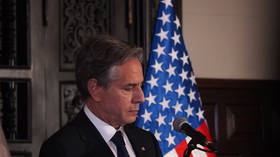Blinken admits Afghan failures – Politico

US Secretary of State Antony Blinken has acknowledged failures in the Afghanistan pull-out, while refusing to release an internal review on the debacle to avoid exposing “vulnerabilities and deficiencies,” Politico revealed on Thursday.
The remarks were reportedly part of a closed-door meeting between Blinken and his staff. The news outlet said it was given access to the event, which was partially conducted online.
The secretary of state spoke to US diplomats after the White House released an After Action Review on Afghanistan, in which it blamed former President Donald Trump for setting up unfavourable terms for his successor, Joe Biden, leading to the chaotic pullout.
“Blinken alternated between chief consoler of the department he leads and Cabinet member defending the administration and his own conduct,” Politico wrote, describing the State Department event.
In his opening remarks, Blinken listed five key lessons learned from the Afghanistan experience, identified in the State Department review. It was led by veteran diplomat Daniel Smith, who investigated the events in the country from January 2020 to the end of August 2021.
The report found that the US diplomatic service failed to prepare for the worst-case scenario of a withdrawal amid a collapse of the US-backed government in Kabul. The last stage of the Western departure occurred after the Taliban seized control of the Afghan capital.
“This was seen as a very low probability, but obviously, potentially very high impact event and more could and should have been done to prepare for it,” Blinken said.
The State Department’s contingency planning was apparently “inhibited” by optics considerations. There was concern that an open preparation to pull the plug “might send the wrong signal [to the Afghan government] that we’d lost confidence in it,” the secretary explained.
Other findings related to organizational problems, unclear priorities, and a failure to properly track US citizens in Afghanistan.
During a Q&A session after his speech, Blinken was asked whether he would make public his department’s assessment of the botched withdrawal. He declined to do so, citing a reluctance to expose “the vulnerabilities and deficiencies that we have” while they are being addressed. Such information “would not be good to share in a broad way” he argued.














